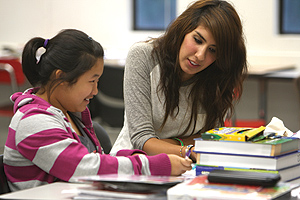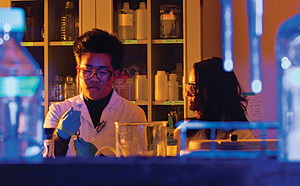Turning theTide
CSUF's STEM Initiative Propels Students Through College and Into the Workforce
The Cal State Fullerton STEM Initiative, which calls for $3.6 million in annual Phase One support and an estimated $16 million in Phase Two projects, will help turn the tide on the dwindling numbers of students prepared in science, technology, engineering and mathematics by enhancing teacher education in STEM fields, dramatically strengthening the university's STEM-related laboratory infrastructure, and expanding specialized programs to get students into STEM degree programs and out to tomorrow's workforce.
A teacher-preparation component of this initiative, based in the College of Education, is a direct response to the urgent nationwide call for effective mathematics and science teaching at all levels, including pre-K through grade 12.
Cal State Fullerton pledged in January 2010 to become part of the national "Educate to Innovate" campaign, an initiative that joins government agencies, businesses and universities in efforts to improve math and science education. As part of this campaign, the CSU has committed to doubling the number of science and math teachers the system prepares by 2015.
The higher-education components of this initiative reside in the colleges of Natural Sciences and Mathematics and Engineering and Computer Science in preparing math, science and engineering students for the modern workforce. Both colleges emphasize active, problem-solving education and provide opportunities for research and exposure to future-focused equipment and protocols. The university is a pioneer in developing programs that encourage students to enter these disciplines and ensuring that they have adequate preparation to be successful.
The university's approach is unique in that it embraces a comprehensive, integrated, multidisciplinary approach to be achieved through multiple efforts in two phases that address both teacher preparation as well as higher education components.
Phase One
CATALYST
The CATALYST programs – through the Center for the Advancement of Research in Teaching and Learning Math and Science – bring together science and math education experts from seven departments in the colleges of Natural Sciences and Mathematics and Education to advance research in teaching and learning across the entire spectrum of math and science education, from preschool through graduate education.
Endowed Fund for Undergraduate Research Programs
Students involved in faculty research projects tend to be more engaged with their studies, perform better in the classroom and demonstrate greater understanding of concepts taught in upper-division science courses. Cal State Fullerton seeks funding to provide scholarship support for undergraduates so students can devote substantial time to research projects and studies.
"Improving Math Proficiency Through Increasing Teacher Impact" Project
To help increase the pool of high-impact teachers of mathematics who create opportunities for all students to develop mathematical proficiency, this program provides for the annual recruitment and support of 40 local fourth- through 12th-grade teachers to attain National Board Certification, the highest benchmark of teacher quality.
Project MISS
Project MISS is honored frequently as a 20-year-old program designed to help underrepresented minority high school girls succeed in college preparatory mathematics at the algebra II level and above. The program has proven highly successful in improving math performance in its targeted audience and has increased the number of high school girls admitted to four-year colleges. Many Project MISS graduates matriculate to Cal State Fullerton.
STEM Professional Development Institutes
Under the umbrella of the College of Education's SchoolsFirst Center for Creativity and Critical Thinking in Schools, this program replicates the successful professional development model the center has utilized for the past four years in the area of arts instruction and expands it into STEM areas. This model provides training and support through intensive two- to three-day institutes taught by content specialists. What is unique is that the institutes bring together CSUF methodology faculty with master teachers and administrators from K-12 school sites, who then together support student teachers in implementing best practices in science and math instruction.
Study 25-35
Many math and science students encounter difficulties when transitioning from high school or community college coursework to Cal State Fullerton. More than one-third are on academic probation or elect to change majors after one year. Many of the students need advising and academic tutoring. The College of Natural Sciences and Mathematics has implemented Study 25-35, an academic early warning program that monitors students' progress and makes them aware of the need to spend significant time studying beginning on the first day of classes, preferably 25-35 hours per week.
Program in Applied Biotechnology Studies (PABS)
Cal State Fullerton has partnered with local industries to design a program that will meet our society's growing need for a scientifically and technically literate workforce through the Program in Applied Biotechnology Studies. The program prepares graduates for challenging and rewarding careers in the biomedical-device, biocomputing and biopharmaceutical industries. Students earning a master's degree through this program have deeper understanding of the scientific principles behind biotechnology, and experience working on a team to solve an industry-assigned problem.
Dean's Scholars Program
This College of Education program, similar to the CSUF President's Scholars program, will provide fully funded scholarships in order to attract the "best and brightest" students into teacher preparation programs with a STEM emphasis.
Supplemental Instruction Support
Introductory courses in sciences and mathematics often become an obstruction for STEM majors, and many STEM undergraduates need assistance to succeed in them. The College of Natural Sciences and Mathematics plans to institutionalize a proven approach for improving academic performance in selected introductory math and science courses through supplemental instruction. Students engage in active and cooperative learning activities, utilizing peer facilitators as resources.
Project ASPEN (After-School Educational Network)
Funded in the past through grants from the Packard Foundation and the California Employment Development Department, ASPEN has established collaborative partnerships between CSUF, three community colleges in North Orange County and organizations that provide after-school programs and workforce opportunities for disadvantaged youth. This is the largest-scale project of its kind in California. Based in the College of Education, there are two key components of ASPEN: the After-School Teacher Pathway program, which encourages after-school program staff to seek careers as STEM teachers, and improvement of the capacity of participating after-school programs to provide extended science learning opportunities for K-12 students.
EPIC (Enhancing Participation in Computing)
The College of Engineering and Computer Science, in collaboration with Cypress College, Fullerton College and the Santa Ana Unified School District, has created Enhancing Participation in Computing (EPIC), a multifaceted partnership program to expand recruitment and increase retention of underrepresented students in computer science and computer engineering. The program's emphasis is on populations underrepresented in the engineering and computer science sectors, such as women and minority students.
Engineering Innovation
The College of Engineering and Computer Science, in a cooperative program with Johns Hopkins University, launched Engineering Innovation in 2010. Engineering Innovation is an exciting college-level, four-week summer program for motivated high school students with an aptitude in math and science and an interest in – or at least curiosity about – engineering. Utilizing project-based learning methods, students learn to think and problem-solve like engineers while earning Johns Hopkins University credit equivalent to the Engineering 100 – Introduction to Engineering course.
ECS Scholars Program
Scholarships based in the College of Engineering and Computer Science support students from populations underrepresented in STEM fields. First-generation college students, especially, face unique social and economic challenges related to pursuing engineering and computer science degrees. A major obstacle for this population is economic, with first-generation students balancing pursuit of college dreams with financial and family obligations. The ECS Scholars Program is a collaborative effort that has won the national Excellencia Semilla award for its exemplary and successful support of Latino student access to engineering programs.
Phase Two
The second phase of Reclaiming Our Future serves as a unifying capstone to the extraordinary efforts of the first phase by constructing new research and instructional laboratories; purchasing and servicing of major instrumentation and new equipment; and other support of faculty and student research facilities.
A new $75-million, 90,000-square-foot LEED gold-certified science facility, the flagship effort of this final phase, will significantly improve research and instructional programs. While state funds may support some of the capital costs of this project, it is estimated that an investment of $15 million in private support will be required for construction.
Since Dan Black Hall – the existing science facility – was constructed in 1994, CSUF has grown significantly. And during this period, the College of Natural Sciences and Mathematics has grown by more than 50 percent. This rapid growth has placed great stress on the college's lab facilities, and additional research space will be required to maintain the quality of the student research experience.
By providing additional, high-quality laboratory workspace, the center will substantially upgrade the learning environment and locate the college's faculty and their students into adjacent spaces – eliminating scattering of labs across two buildings. A building with shared space creates an environment rich with potential collaborations.
An additional $1-million investment will fund new laboratory equipment, which is essential to performing many types of research and to training students for ready assimilation into the workforce. ![]()


